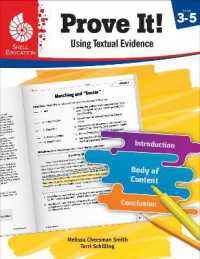Full Description
Almost every educational idea worth a thought has been considered at the University of Illinois, and anything worth trying has been tested. In this history of ideas, Bill Cope and Walter Feinberg chronicle the intellectual lives of education thinkers at the university while tracking the development of educational ideas and practices in general. Cope and Feinberg draw on conversations, narratives, and archival research that reveal how different generations explored their role in defining and carrying out the College's multifaceted mission. Their account raises critical questions about the character of learning, the aims of teaching, and the nature of teaching as a profession. At the same time, the authors address issues that range from the role of schools in fostering individual and collective identity to the introduction of computer-mediated and online learning. Cope and Feinberg examine changes in self-understanding about fundamental ideas and chart how the College evolved from its original narrow mission of training children's schoolteachers to embracing global perspectives.
A wide-ranging portrait of an institution, Arguments for Learning uses the School of Education to tell the stories of thinkers dedicated to the idea that education can change the world for the better.
Contents
Foreword Mary Kalantzis
Acknowledgments
Introduction
Part I. Beginnings
In the Beginning: Education at Illinois, 1867-1905
A School of Education and the Struggle for a Profession of Teaching, 1905-1917
Growing a College and Establishing a Research Tradition, 1918-1930
Depression, Social Crisis, and Professionalization of Education, 1931-1945
Part II. Defining the Discipline
What Kind of Study Is Education?
Establishing Social Foundations, 1945-1957
Shaping and Debating Educational Psychology, 1948-1966
The Foundations of Cognitive Psychology, 1963-
Debating the Shape of Instruction and Assessment, 1964-
Critical Thinking and Educational Inquiry, 1950-
The Qualitative Turn, 1964-
Part III. Equity and Diversity in Learning
Cold War Tensions, Sputnik, and New Beginnings, 1950-1964
Life Adjustment or Educational Wasteland? Debating Progressive Education, 1953-1986
Special Education and Disability Services, 1946-
Racism and Education, 1948-1956
Growing Diversity, 1968-
Part IV. Technology in Learning
Computers in the Service of Learning, 1949-1976
New Math and Inquiry Science, 1951-1976
The Cybernetics of Learning, 1949-1975
Going Online, 1993-
New Learning, 2006-
Notes
References
Index








